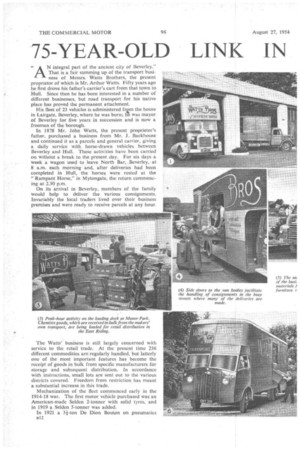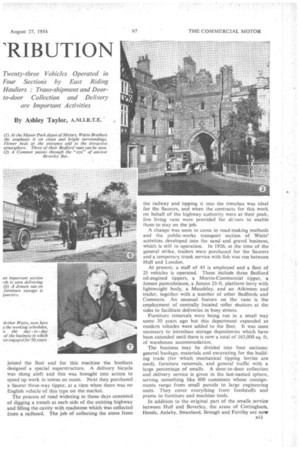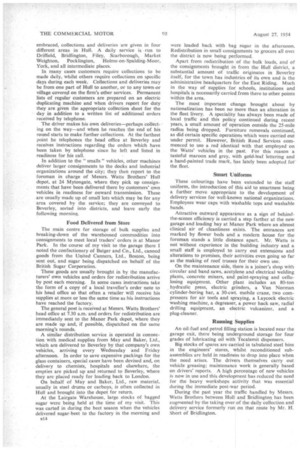75-YEAR-OLD LINK IN UTION
Page 46

Page 47

Page 48

If you've noticed an error in this article please click here to report it so we can fix it.
Twenty-three Vehicles Operated in Four Section's by East Riding Hauliers : Trans-shipment and Doorto-door Collection and Delivery
are Important Activities By Ashley Taylor, A.M.I.R.T.E.
" N integral part of the ancient city of Beverley."
That is a fair summing up of the transport busi ness of Messrs. Watts Brothers, the present proprietor of which is Mr. Arthur Watts. Fifty years ago he first drove his father's carrier's cart from that town to Hull. Since then he has been interested in a number of different businesses, but road transport for his native place has proved the permanent attachment.
His fleet of 23 vehicles is administered fr2m the house in Lairgate, Beverley, where he was born; II/ was mayor of Beverley for five years in succession and is now a freeman of the borough.
In 1878 Mr. John Watts, the present proprietor's father, purchased a business from Mr. J.. Backhouse and continued it as' a parcels and general carrier, giving a daily service with horse-drawn . vehicles between Beverley and Hull. These activities have been carried on without a break .to the present day.. For six days .a week a wagon used to .leave _North Bar, ,Beverley, at 8 a.m. each morning and, after deliveries had been completed in Hull, the horses were rested at the "Rampant Horse," in Mytongate, the return commencing at 2.30 p.m.
On its arrival in Beverley, members of the family would help to deliver the various consignments. Invariably the local traders lived over their business premises and were ready to receive parcels at any hour.
The Watts' business is still largely concerned with service to the retail trade. At the present time 236 different commodities are regularly handled, but latterly one of the most important features has become the receipt of goods in bulk from specific manufacturers for storage and subsequent distribution. In accordance with instructions, small lots are sent out to the various
districts covered. Freedom from restriction has meant a substantial increase in this trade.
Mechanization of the fleet commenced early in the 1914-18 war. The first motor vehicle purchased was an American-made Selden 2-tonner with solid tyres, and in 1919 a Selden 5-tonner was added.
In 1921 a 3i-ton De Dion Bouton on pneumatics 13 12
joined the fleet and for this machine the brothers designed a special superstructure. A delivery bicycle was slung aloft and this was brought into action to speed up work in towns en route. Next they purchased . a Saurer three-way tipper, at a time when there was no English vehicle of this type on the market.
The process of road widening in those days consisted of digging a trench at each side of the existing highway and filling the cavity with roadstone which Was collected from a railhead. The job of collecting the stone from the railway and tipping it into the trenches was ideal for the Saurers, and when the contracts for this work on behalf of the highway authority were at their peak, live living vans were provided for dr:vers to enable them to stay on the job.
A change was soon to come in road-making methods and the public-works transport Section • of Watts' activities developed into the sand and gravel business, which is still in operation. In 1926, at the time of the general strike, trailers were purchased for the Saurers and a temporary trunk service with fish was run between Hull and London.
At present, a staff of 45 is employed and a fleet of 23 vehicles is operated. These include three Bedford oil-engined tippers, a Morris-Commercial tipper, a Jensen pantechnicon, a Jensen 23-ft. platform lorry with lightweight body, a Maudslay, and an Atkinson and trailer, together With a number of other Bedfords and Commers. An Unusual feature on the vans is the employment of centrally located roller shutters at the sides to facilitate deliveries in busy streets.
Furniture removals were being run in a small way some 30 years ago but this department expanded as modern vehic$es were added to the fleet. It was soon necessary to introduce storage depositories which have been extended until there is now a total of 163,000 sq. ft. of warehouse accommodation.
The business may be divided into four sections: general haulage, materials and excavating for the building trade (for which mechanical tipping lorries are used), furniture removals, and general traffic with a large percentage of smalls. A door-to-door collection and delivery service is given in the last-named sphere, serving something like 600 customers whose consignments range from small parcels to large engineering units. They cover everything from foodstuffs and prams to furniture and machine tools.
In addition to the original part of the smalls service between Hull and Beverley, the areas of Cottirighatn, Hessle, Anlaby, Swanland, Waugh and Ferriby are now 1313 embraced, collections and deliveries are given in four different areas in Hull. A daily service is -run to Driffield, Bridlington, Filey, Scarborough, Market Weighton, Pockfington, Holme-on-Spalding-Moor, York, and all intermediate places.
In many cases customers require collections to be made daily, whilst others require collections on specific days during each week. Collections and deliveries may be from one part of Hull to another, or to any town .or village covered on the firm's other services. Permanent lists of regular customers are prepared on an electric duplicating machine and when drivers report for duty they are given the appropriate collection sheet for the day in addition to a written list of additional orders received by telephone.
The driver makes his own deliveries—perhaps collecting on the way—and when he reaches the end of his round starts to make further collections. At the farthest point he telephones the head office at Beverley and receives instructions regarding the orders which have been taken by telephone since he left and listed in readiness for his call.
In addition to the " smalls " vehicles, other machines deliver larger consignments to the docks and industrial organizations around the city; they then report to the foreman in charge of Messrs. Watts Brothers' Hull depot, at 24 Mytongate, where they pick up consignments that have been delivered there by customers' own vehicles in readiness for onward transmission. These are usually made up of small lots which may be for any area covered by the service; they are conveyed to Beverley, sorted into districts, and leave early the following morning.
Food Delivered from Store
The main centre for storage of bulk supplies and breaking-down of the warehoused commodities into consignments to meet local traders' orders is at Manor Park. In the course of my visit to the garage there I noted the confectionery of Batger and Co., Ltd., canned goods from the United Canners, Ltd., Boston, being sent out, and sugar being dispatched on behalf of the British Sugar Corporation.
These goods are usually brought in by the manufacturers' own vehicles and orders for redistribution arrive by post each morning. In some cases instructions take the form of a copy of a local traveller's order note to his head office so that often a retailer will receive his supplies at more or less the same time as his instructions have reached the factory.
The general post is received at Messrs. Watts Brothers' head office at 7.30 a.m. and orders for redistribution are immediately sent to the Manor Park depot, where they are made up and, if possible, dispatched on the same morning's rounds.
A similar distribution service is operated in connection with medical supplies from May and Baker, Ltd., which are delivered to Beverley by that company's own vehicles, arriving every Wednesday and Friday afternoon. In order to save expensive packings for the glass containers, special cases have been devised and, on delivery to chemists, hospitals and elsewhere, the empties are picked up and returned to Beverley, where they are placed ready for loading back to London. On behalf of May and Baker, Ltd., raw material, usually in steel drums or carboys, is often collected in Hull and brought into the depot for return.
At the Lairpte Warehouse, large stocks of bagged sugar were being held at the time of my visit. This was carted in during the beet season when the vehicles delivered sugar-beet to the factory in the morning and 814 were loaded back with bag sugar in the afternoon. Redistribution in small consignments to grocers all ovet the district is now being performed.
Apart from redistribution of the bulk loads, and of the consignments brought in from the Hull district, a substantial amount of traffic originates in Beverley itself, for the town has industries of its own and is the administrative headquarters for the East Riding. Much in the way of supplies for schools, institutions and hospitals is necessarily carried from there to other points within the area.
The most important change brought about by nationalization has been no more than an alteration in the fleet livery. A speciality has always been made of local traffic and this policy continued during recent years, a small amount of operation outside the 25-mile radius being dropped. Furniture removals continued, as did certain specific operations which were carried out under permit. However, British Road Services commenced to use a red identical with that employed on the Watts' vehicles in the past. For this reason a tasteful maroon and grey, with gold-leaf lettering and a hand-painted trade mark, has lately been adopted fel-the fleet.
Smart Uniforms
These colourings have been extended to the staff uniform, the introduction of this aid to smartness being a further move appropriate to the development of delivery services for well-known national organizations. Employees wear caps with washable tops and washable bands.
Attractive outward appearance as a sign of behindthe-scenes efficiency is carried a step farther at the new garage and loading bay at Manor Park where an almost clinical air of cleanliness exists. The entrances are marked by flower beds and a modern house for the foreman stands a little distance apart. Mr. Watts is not without experience in the building industry and a small staff is employed to carry out extensions and alterations to premises, their activities even going so far as the making of roof trusses for their own use.
On the maintenance side, there is a joiner's shop with circular and band saws, acetylene and electrical welding plants, concrete mixers, and paint-spraying and cellulosing equipment. Other plant includes an 80-ton hydraulic press, electric grinders, a Van Norman cylinder-boring bar, a 30-cwt. mobile crane, two compressors for air tools and spraying, a Laycock electric washing machine, a degreaser, a power hack saw, radial drilling equipment, an electric vulcanizer, and a plug-cleaner.
Running Supplies
An oil-fuel and petrol filling station is located near the garage exit, there being underground storage for four grades of lubricating oil with Tecalemit dispensers.
Big stocks of spares are carried in tabulated steel bins in the engineers' stores, whilst reconditioned subassemblies are held in readiness to drop into place when the need arises. The drivers themselves carry out vehicle greasing; maintenance work is generally based on drivers' reports. A high percentage of new vehicles is now in use and this development has reduced the need for the heavy workshops activity that was essential during the immediate post-war period.
During the past year the traffic handled by Messrs. Watts Brothers between Hull and Bridlington has been augmented by the taking over of the daily collection and delivery service formerly run on that route by Mr. H. Short of Bridlington.




























































































